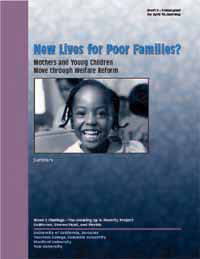Mothers and Young Children Are Not Doing Well by Welfare Reform
Policy leaders in Washington and the states are engaging a new debate over an old question: How can society best aid jobless mothers and enrich their children's lives?
The dramatic reform of family welfare policies in 1996, aided by robust economic growth, has moved millions of women into low-wage jobs.
But how to build from this success?
One fact is clear: We know surprisingly little about how state welfare-to-work programs have touched the lives of young children since 1996, and perhaps altered the home and child care settings in which they are now being raised.
The "Growing Up in Poverty Project" report, written in April by a consortium of scholars from Teachers College, the University of California, Berkeley, Stanford and Yale Universities, helps to fill that gap.
Sharon Lynn Kagan, Virginia and Leonard Marx Professor of Early Childhood and Family Policy and co-director of the study, said, "Our project team followed an initial sample of 948 mothers and preschool-age children for two to four years after the women entered new welfare programs-in California, Connecticut, and Florida. After two rounds of interviews with mothers, assessments of their children's development, and visits to homes and child care settings, these major findings have emerged:
Many women have moved into low-wage jobs, and their total income has risen significantly. Yet their income remains at just over $12,000 annually, with most still living below the poverty line.
Related measures of economic well-being show little improvement. For example, almost one fifth of all mothers recently cut the size of meals because they didn't have enough money to buy more food, three times the rate reported by all adults nationwide. The average mother reported about $400 in savings.
The magnitude of income gains, thus far, is too weak to improve home environments or allow women to move into better neighborhoods. Mothers are spending less time with their preschool-age children as they leave home for jobs. No consistent gains were detected in proliteracy parenting practices, like reading with their children, establishing dinner-time or bedtime routines, sensitivity toward the child, or for 49 other measures of home qualities.
Participating mothers displayed twice the rate of clinical depression, two in every five, compared to the general population. Maternal depression sharply depresses their young children's development.
Many children moved into new child care centers and preschools. Lower-performing children who entered center-based programs displayed significantly stronger gains in cognitive skills and school readiness-moving about three months ahead of the children who remained in home-based settings. This positive relationship was significantly stronger for children who attended higher quality centers.
Research papers and copies of this report are available by calling the Berkeley project office, 510-642-7223, or online at www.tc.edu/new-lives.
Published Sunday, May. 19, 2002

